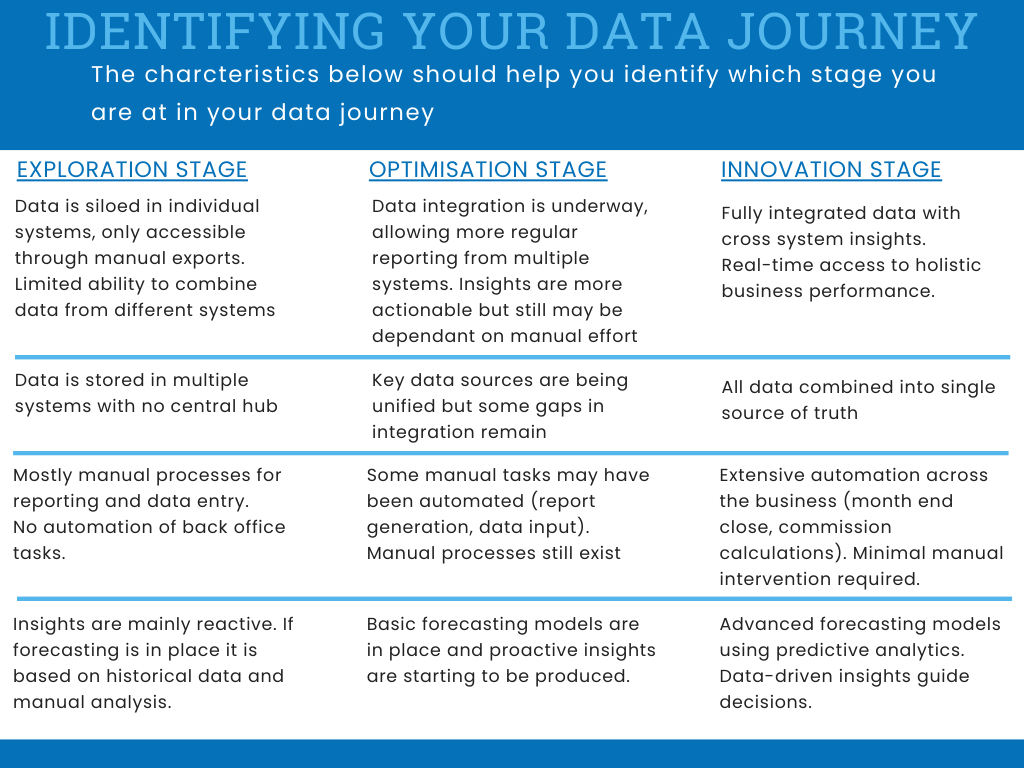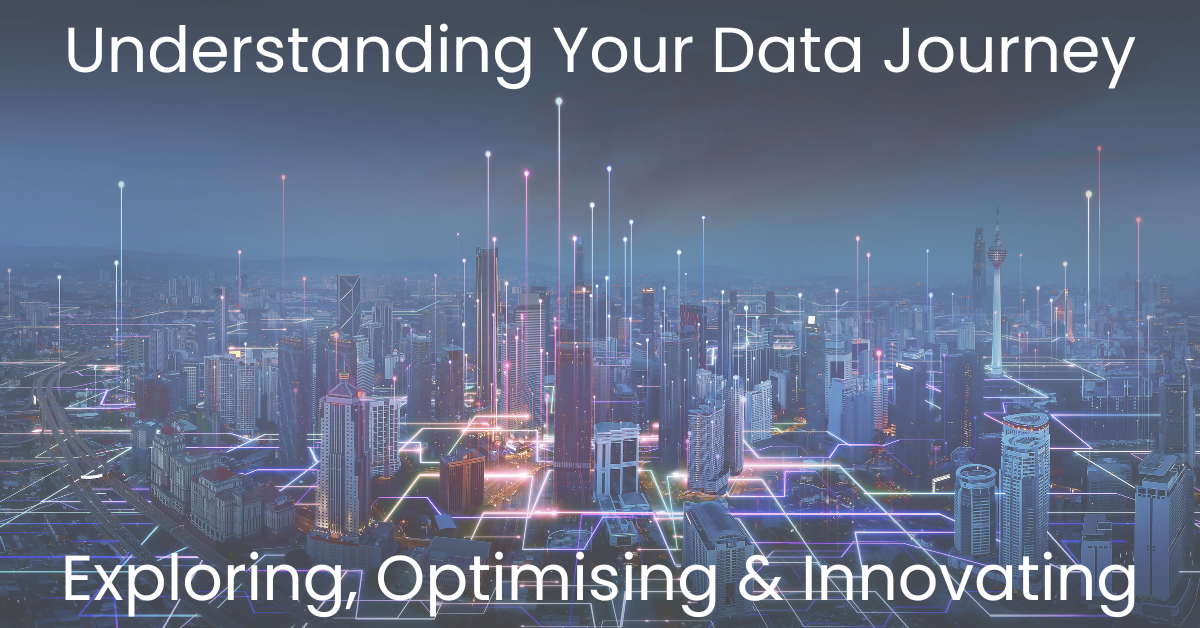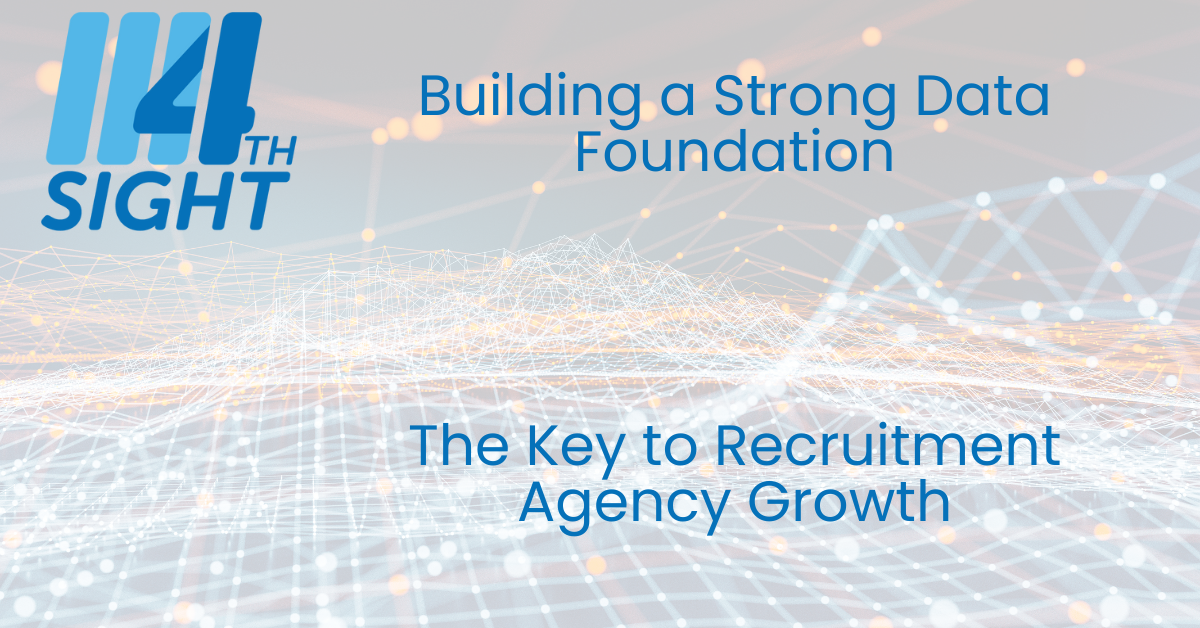In the competitive Recruitment Industry, leveraging data effectively is crucial for driving business success. Knowing where you are on your data journey and how to progress can significantly impact your agency’s efficiency and effectiveness. This article explores the three key stages of a business’s data journey: Exploration, Optimisation, and Innovation, and provides actionable insights on how to accelerate through these stages.
Exploration Stage – Laying the Foundation – The Exploration Stage is where businesses start their data journey. At this stage, the focus is on understanding the value of data and beginning to gather and analyse it.
Optimisation Stage – Enhancing Efficiency – The Optimisation Stage focuses on refining and improving data practices. Businesses at this stage have a good grasp of their data and seek to enhance its use for better efficiency and accuracy.
Innovation Stage – Leading with Data – The Innovation Stage is where businesses leverage data to drive innovation and create a competitive edge. At this stage, data is a key driver of strategic initiatives and business growth.

You should be able to identify where you are on your data journey. Are you still exploring or are your starting to optimise or even innovate? What do you do next?
Moving from Exploration to Optimisation
At the Exploration Stage, businesses often rely on manual exports and individual reports from separate systems, leading to fragmented insights. However, to truly unlock the value of your data, moving to the Optimisation Stage is essential. Here’s how you can do it:
- Automate Data Processes: Start automating repetitive tasks like data entry, report generation, and data extraction. By using automation tools, you’ll free up time, reduce manual errors, and speed up your workflows.
- Automation helps reduce inefficiencies and enables your team to focus on high-value tasks rather than being bogged down by routine administrative work.
- Invest in Data Integration: Bring together data from different systems (CRM, finance, timesheets) into a single, centralised source of truth. This enables you to generate insights that reflect the complete picture of your business.
- Integration eliminates silos and allows for consistent, reliable reporting, empowering better decision-making across departments.
- Adopt Advanced Analytics: Moving beyond simple reports, invest in tools that offer deeper analytics capabilities. By leveraging cross-system insights, you can better understand trends and performance across the entire business.
- You gain a more accurate, real-time view of your operations, enabling more data-driven strategies for growth.
Moving from Optimisation to Innovation
Once you’ve optimised your data practices, the next step is to embrace innovation. This means using your data not just to analyse the past but to shape the future of your business. Here’s how you can make that leap:
- Implement Predictive Analytics: Start using advanced tools that analyse historical data to predict future outcomes. By leveraging machine learning models, you can forecast cash flow, demand, and other critical business metrics.
- Predictive analytics enable proactive decision-making, allowing you to anticipate market shifts, manage risk, and capitalise on opportunities.
- Embrace Full Automation: Move from partial to full automation across your business processes. Whether it’s back-office tasks like commission calculations, month-end close, or client reporting, advanced automation tools can streamline operations end-to-end.
- Full automation significantly reduces overheads, increases accuracy, and allows your team to scale with fewer resources, improving overall efficiency.
- Develop a Data-Driven Culture: For true innovation, it’s important to foster a data-first mindset across your organisation. Encourage all departments to use data in their decision-making processes, making insights available and actionable for everyone.
- A data-driven culture ensures that your business is agile, able to respond quickly to changes in the market, and continually improving based on solid insights.
The Benefits of Moving Forward in Your Data Journey
As you progress along your data journey, the benefits compound and significantly impact your business’s performance:
- Improved Decision-Making: Moving from manual data processes to automated insights helps ensure that your decisions are backed by real-time, accurate data.
- Increased Efficiency: Automation of tasks and the integration of data sources eliminate time-consuming manual work, enabling your team to operate more efficiently and with fewer errors.
- Proactive Insights: As you implement predictive analytics and real-time reporting, you can shift from reactive decision-making to a more strategic and forward-thinking approach.
- Competitive Advantage: Businesses that invest in optimising and innovating their data practices are better positioned to anticipate market trends, respond to client needs more effectively, and ultimately gain a competitive edge.
- Scalability: With intelligent automation and an integrated data infrastructure, your business can scale faster, managing more volume without a proportional increase in costs or administrative overhead.
- AI Ready: Aggregating your data into a single environment gets your data in a position to harness the power of AI tools which will be released over the coming years to give you a real commercial advantage.
If you’d like to better understand where you are on your data journey, complete our quick quiz.
Answer a few simple questions and discover whether your business is in the exploration, optimisation or innovation stage. We’ll also provide tailored recommendations to help you accelerate your data journey and unlock the full potential of your business insights.







